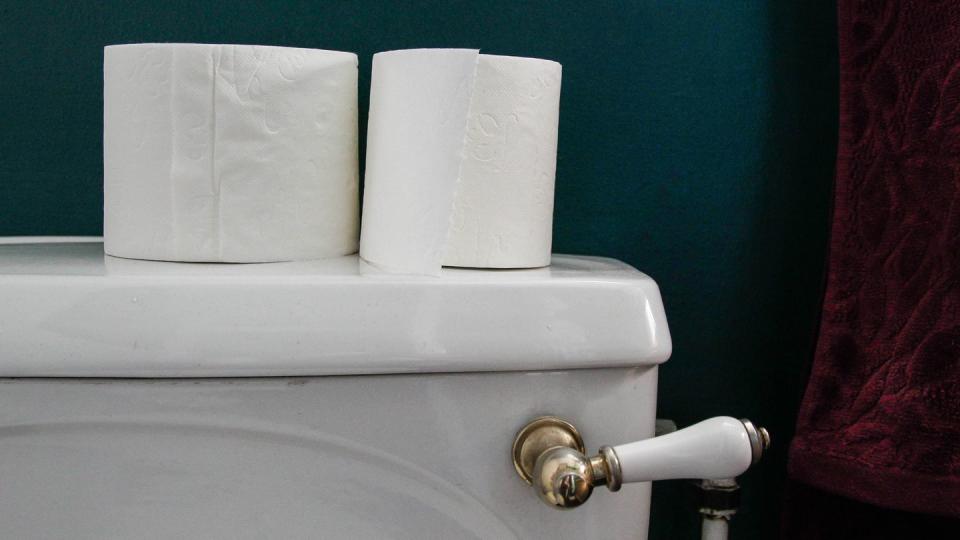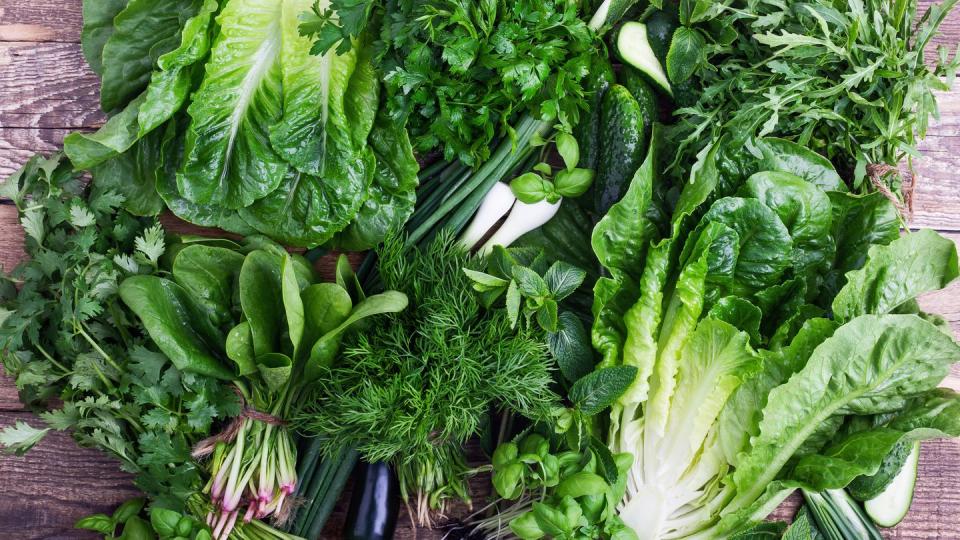The Side Effects Of Apple Cider Vinegar May Actually Outweigh Any Weight-Loss Benefits
Fad diets are almost always B.S., and many of them end up being pretty bad for you in the long and short run. So color me skeptical at the idea that vinegar consumption alone will help people healthily lose weight. And yet the apple cider vinegar detox has entrenched itself as a celebrity favorite for weight loss, regular bowel movements, and generally cleaner living.
The apple cider vinegar diet, or detox, entails diluting a few tablespoons of ACV with water, and maybe mixing in some honey if you're fancy. (And/or hate the taste of vinegar.) Some people add lemon; some people sprinkle in cayenne, consuming this concoction periodically throughout the day. Some devotees will undertake a cleanse and subsist on only ACV drinks for its duration; others will supplement with light meals composed of fruits, vegetables, and lean proteins. Allegedly, ACV-based rewards include a balanced bodily pH; less appetite; better digestion; a stronger immune system; lower cholesterol; more stable blood sugar; and fewer toxins.
Unfortunately, there exists relatively little data to substantiate the benefits claimed by ACV acolytes. One 2017 study suggested that vinegar could help stabilize blood glucose levels, and a Japanese study from 2009 indicated that vinegar consumption might have reduced some participants' BMIs. And yet there's all this unshakeable hype around ACV. So Women's Health decided to ask a nutritionist: What side effects can people realistically expect from following the ACV diet?
I reached Leslie Bonci, a registered dietician and the owner of Active Eating Advice, on her way to the grocery store. What wouldn't she be adding to her cart? Apple cider vinegar: To start, Bonci said, there's nothing particularly special about ACV that would make it more or less beneficial than drinking any kind of vinegar. And there's no reason to believe that adding a bottle of ACV to your daily diet you do any more good than adding an extra tablespoon, she said.
"More is not necessarily better," Bonci tells me. "It’s not just drinking [ACV] more for the sake of drinking more. It’s probably not going to be harmful, but nor is it beneficial to do that."
"Vinegar does not, itself, equal weight loss," she added. It might contribute to weight loss if you're using it as a replacement for a more calorie intensive ingredient, like mayonnaise in potato salad, because it adds flavor without the extra caloric burden, Bonci explains. But there's nothing magical about vinegar, apple cider or otherwise, that allows it to burn up cholesterol or zap fat from your waistline. According to Bonci, a number of the side effects ACV enthusiasts claim are baseless — and in certain circumstances, the ACV diet may actually have the opposite of its intended effect.
Your skin probably won't improve
One popular assertion about apple cider vinegar is that it balances pH, which is beneficial for both skin and vaginal complaints. According to Bonci, though, that's a myth: ACV "does not change the [body's] pH at all."
"Our body does a really good job of knowing how to keep itself in the proper pH balance," she says, and you'd have to drink a much stronger tonic to make an impact. "Honestly, we would have to be consuming something like hydrochloric acid, which we’re not going to do, in order to change that."
You may feel extremely weak
Bonci does not recommend subsisting on ACV drinks alone, even for a limited time. When you slash your food consumption, she says, "You’re going to be hungrier, you may be weaker because your calorie intake is so very very low," she warns. "It really creates that sense of imbalance, big time."
Bonci suggests vinegar on top of a meal that incorporates vegetables, protein, and carbohydrates, as a replacement for a heavier dressing or seasoning. That way, your body still gets the fuel it needs, but you've avoided throwing a blue cheese dressing calorie bomb into your diet.
Your appetite may actually increase
ACV is allegedly an appetite suppressant, helping to slow digestion and keep people fuller longer. In her trial run of the ACV diet, Women's Health writer Kristin Canning reported that she noticed no great change in how hungry she was. According to Bonci, people who heavily consume ACV drinks might actually end up accelerating their appetites, again because vinegar has no caloric basis.
"It’s not that somebody’s drinking a bottle of vinegar, it’s that they’re drinking some vinegar diluted in a copious amount of water," she says. "You feel full for the moment that you’re having it, because you’ve just consumed a gallon of water, but when you pee that out, you’re going to be hungrier, sooner."
You may lose weight — temporarily
In that same vein, an ACV diet might actually make you gain weight: "Since your calorie level is so low, primarily you’re losing water," Bonci says. "So when you replace that water, your weight will come back on.
Further, she says, "If you’re losing anything in terms of actual weight, it’s going to be more reflective of the loss of lean mass, because you’re not taking in the calories you need and the body still has to generate fuel for itself, so it’s going to be breaking down muscle."
If you do slim down on an ACV detox, like any crash diet, that rapid weight loss might end up slowing your metabolism and making it harder to shed pounds in the future.
You won't come away with a super immune system
There is evidence to suggest that probiotics and healthy gut bacteria translate to a strong immune system. ACV is a fermented liquid, and fermentation holds probiotic properties, so could it be an immunity booster? Probably not, says Bonci. Fermented foods can help increase good bacteria, she says, and some — like sauerkraut — do come in a vinegar base. But the vinegar alone probably isn't going to pack the probiotic punch that imparts a steel immune system. (And then, it's worth noting that nutritional deficiencies do take a toll on your immune health.)
You probably won't poop more, you may even poop less
Probiotics are also credited with producing more regular bowel movements, as is the consumption of fiber. Apples are an excellent source of fiber, so I asked Bonci whether or not ACV dieters could expect to poop more. Her answer? No.
"It’s just vinegar, it’s not a source of fiber in and of itself," she said. And while it's true that drinking more water helps you avoid constipating dehydration, Canning found that — in her trial run — she actually had fewer bowels movements with more difficulty. The most probable explanation? Swapping an ACV drink for your usual caffeinated morning and/or afternoon beverage means you're not getting that stimulating kick to the digestive system.
You could stabilize your blood sugar — if you use ACV more creatively
For diabetics — or really anyone looking to stabilize their blood sugar — Bonci says vinegar could be useful, but as part of a balanced meal rather than as a beverage. She pointed to data that indicates vinegar might be useful at blocking starch absorption, and therefore mitigating blood sugar spikes. But these results are linked to carbohydrate consumption, she stressed. So get a little more creative with the way you consume ACV: Rather than just having a salad with chicken and lettuce, for example, try adding some rice and some vinegar to stabilize your blood sugar.
"If you’re using that example of a potato salad or a pasta salad, change the dressing," she says: use vinegar over mayonnaise. "If you are a diabetic, that would be the advantage: I don’t have to give up those foods, I can enjoy them and guess what, my blood glucose didn’t rise in response to eating them."
At the end of the day, Bonci says, vinegar — any vinegar — is a great option for adding flavor to food without skewing its caloric value. But it's not a miracle nectar.
Apple cider vinegar, or ACV, continues to reign as a wellness superstar for its supposed health benefits. But too much can actually do a number on your body and lead to some undesirable side effects.
It’s not the tastiest ingredient, but ACV weight loss claims aren’t totally bogus. It can help in some ways: If you're replacing a calorie-bomb condiment like mayo with ACV, it might help you cut some calories, says Leslie Bonci, RD, the owner of Active Eating Advice. Just note that applies to any type of vinegar, not just the apple cider variety.
Consuming ACV has also been touted as a positive health practice that can potentially help regulate blood sugar and lower cholesterol, but it can cause serious digestive distress in some people, notes Eliza Savage, RD, a NYC-based registered dietitian. That's because of the high acidity levels, which may cause gastrointestinal issues, depending on how much you drink, says Ella Davar, RD, who is based in NYC and Miami. “Drinking a whole shot on an empty stomach is definitely too much for those with sensitive digestive systems,” she says. If you have been diagnosed with Crohn's disease, gastritis, or irritable bowel syndrome, Davar says you should skip this beverage altogether.
“Apple cider vinegar is relatively safe to consume, but it can cause side effects in some people, so be aware of any stomach upset or other adverse reactions and discontinue use if necessary,” says Erin Palinski-Wade, RD, a Sparta, New Jersey-based registered dietitian and author of 2 Day Diabetes Diet. ACV should also never be used as a meal replacement or in lieu of prescribed medications, she adds. If you’re not sure if your body can handle it, check with your primary care physician first. And, PSA, ACV always should be diluted in water; more on this in a bit.
Still curious to try apple cider vinegar? Here are 9 side effects you may experience if you consume too much, according to nutrition experts.
Meet the experts: Erin Palinski-Wade, RD, is a Sparta, New Jersey-based registered dietitian and author of 2 Day Diabetes Diet. Leslie Bonci, RD, is a Pittsburgh-based registered dietitian and the owner of Active Eating Advice. Eliza Savage, RD, is a New York City-based nutritionist. Ella Davar, RD, is a New York City and Miami-based nutritionist who specializes in gut health. Amanda Baker Lemein, RD, is a Chicago-based registered dietitian. Soma Mandal, MD, is an internist at Summit Medical Group in Berkeley Heights, New Jersey.
You could have an upset stomach.
"Because vinegar is acidic, some people don’t tolerate it all that well," says Bonci. Not everyone will experience this issue, but if you have ulcerative colitis, inflammation in your digestive tract, or are just prone to stomach aches, you'll probably want to steer clear.

You may experience changes in your bowel movements.
Because ACV is made from fermented apples, it contains pectin, "a soluble dietary fiber that acts as a natural gelling agent," says Savage. The pectin in ACV can help bulk up your stool, promote the growth of good bacteria in the gut, and reduce inflammation. Sounds amazing, right?
But people who consume too much ACV could experience diarrhea. "The ACV may pull water into the bowel," says Savage. This means that your stool may come out watery and more frequently in the form of diarrhea. Needless to say, a not-so-pleasant bathroom experience could await.

You could compromise your kidneys.
Another big Q about ACV is whether apple cider vinegar can hurt your kidneys. Amanda Baker Lemein, RD, cautions people with pre-existing kidney issues from consuming ACV.
Foods with higher levels of acid have been linked to the progression of kidney failure, says Davar. Alkaline foods like green, leafy vegetables may be a better option, but as always, consult your primary care physician before trying ACV if you have kidney issues. ACV can cause additional damage to those with chronic kidney disease.

You could experience uncomfortable bloating.
"Consuming apple cider vinegar delays stomach emptying," says Savage. This reduces the rate at which food leaves the stomach and enters the lower digestive tract, meaning you'll feel fuller longer. At times, delayed stomach emptying can cause temporary weight loss, Savage says. But it can also cause some serious bloating, gas, and nausea.

You could worsen acid reflux symptoms.
"Anyone who has acid reflux will want to be cautious of overly acidic foods," says Lemein. This includes ACV, which falls between a two and a three on an acidity scale of zero to seven (zero being the most acidic).
"I would argue that most people find that introducing more acid into their diet negatively affects their previously occurring issue," says Savage.
More ACV equals more stomach acid. And more stomach acid can heighten or increase the burning sensation for people who already experience heartburn or reflux.

Your appetite might increase.
Word on the street is that ACV is an appetite suppressant, but Bonci says people who drink a lot of diluted ACV (in replacement of, say, a snack) might actually end up hungrier because vinegar is so low cal.
"You feel full for the moment that you’re having it because you’ve just consumed a gallon of water, but when you pee that out, you’re going to be hungrier, sooner," she says.

Your tooth enamel may begin to erode.
Diets high in acidic foods, like fruit juices and citrus fruits, have been shown to lead to damaged tooth enamel, studies show. Tooth enamel erosion is definitely something you want to avoid—once it occurs, there’s not much you can do besides cosmetic repair procedures like bonding.
Since apple cider vinegar is acidic, overconsumption can lead to dental erosion too, says Soma Mandal, MD, an internist at Summit Medical Group in Berkeley Heights, New Jersey.

You may experience interactions with certain drugs.
Because apple cider vinegar can lead to delayed stomach emptying, or gastroparesis, it can be a major problem if you take certain meds that need to pass through your body and be absorbed in a certain time frame, says Dr. Mandal.
“Extra caution needs to be taken if you’re taking diuretics, insulin, blood pressure medication, and laxatives,” says Dr. Mandal. “This is especially concerning for people with type 1 and 2 diabetes, since gastroparesis can lead to difficulty controlling blood sugar,” she says.

Your potassium levels may drop.
Another potential side effect to be aware of is hypokalemia, which occurs when potassium levels drop too low, says Dr. Mandal. Hypokalemia can lead to cardiac arrhythmia, or an irregular heartbeat. “When you have low potassium, you can also experience muscle cramps, weakness, and fatigue,” says Dr. Mandal. “This is even more concerning for people who are taking blood pressure medications such as diuretics,” which can also lower potassium.
Palinski-Wade adds that ACV has the ability to lower your potassium levels (especially if you overdo it), so if you already have low potassium you should avoid consuming it without talking to your doc. Either way, if you're concerned or present symptoms of low potassium (muscle twitches, muscle cramps, lightheadedness, excessive urination, etc) it's best to stop ACV consumption and check in with your doctor.

How To Safely Consume Apple Cider Vinegar
If you’re still interested in consuming ACV for the good benefits it’s touted for, the key is portion control. "Start with one to two teaspoons of diluted ACV with eight ounces of water and progress up to one tablespoon mixed with eight ounces of water," Savage says. "ACV should always be diluted."
Drinking ACV through a straw and rinsing your mouth with water after consumption can also help prevent any potential damage or erosion to your teeth, adds Palinski-Wade.
Dr. Mandal recommends consuming it with a meal too. “If you decide to start taking ACV, consult your primary care physician to make sure there aren't any potential complications first,” she says. Always a good idea with any diet change!

Are apple cider vinegar gummies legit?
“The benefits of ACV come from the acetic acid, and in order to get the same amount of acetic acid that you would find in one tablespoon of AVC, you would need to consume approximately 30 gummies,” says Palinski-Wade. This is not recommended! “The sugar and calorie content of doing that alone would cancel out any potential benefits,” she explains.
There’s also no scientific evidence that proves gummies have the same effect as raw ACV, and any health benefits associated with the liquid form have not been linked to the chewable version.

Who should avoid apple cider vinegar?
Apple cider vinegar is generally safe for most people, but those with esophageal or stomach issues such as gastroesophageal reflux disease (GERD), irritable bowel syndrome, and Crohn's Disease should not use ACV as it may worsen symptoms, says Palinski-Wade. ACV can also break down tooth enamel, so those with enamel erosion should avoid consuming it unless directed by their dentist, she adds.
Additionally, ACV can interact with certain diuretics and diabetes medications, so always consult a doctor if you’re taking any meds, notes Palinski-Wade. And if you experience indigestion, nausea, or other undesirable side effects, stop ACV use, and talk with your doctor.

Does apple cider vinegar help you lose weight?
Apple cider vinegar on its own is not a magic bullet for weight loss, but it may give you an edge in shedding pounds, says Palinski-Wade. “Apple cider vinegar may help to promote fullness with and after meals, which may help with portion control and promote weight loss,” she explains. In fact, those who consumed a tablespoon of ACV with meals while also cutting 250 calories a day lost more weight in 12 weeks than those who only lowered their caloric intake, one study published in the Journal of Functional Foods found.
That said, if your goal is to lose weight, it’s important to focus on other lifestyle changes as well such as a balanced diet and regular exercise.

You Might Also Like


